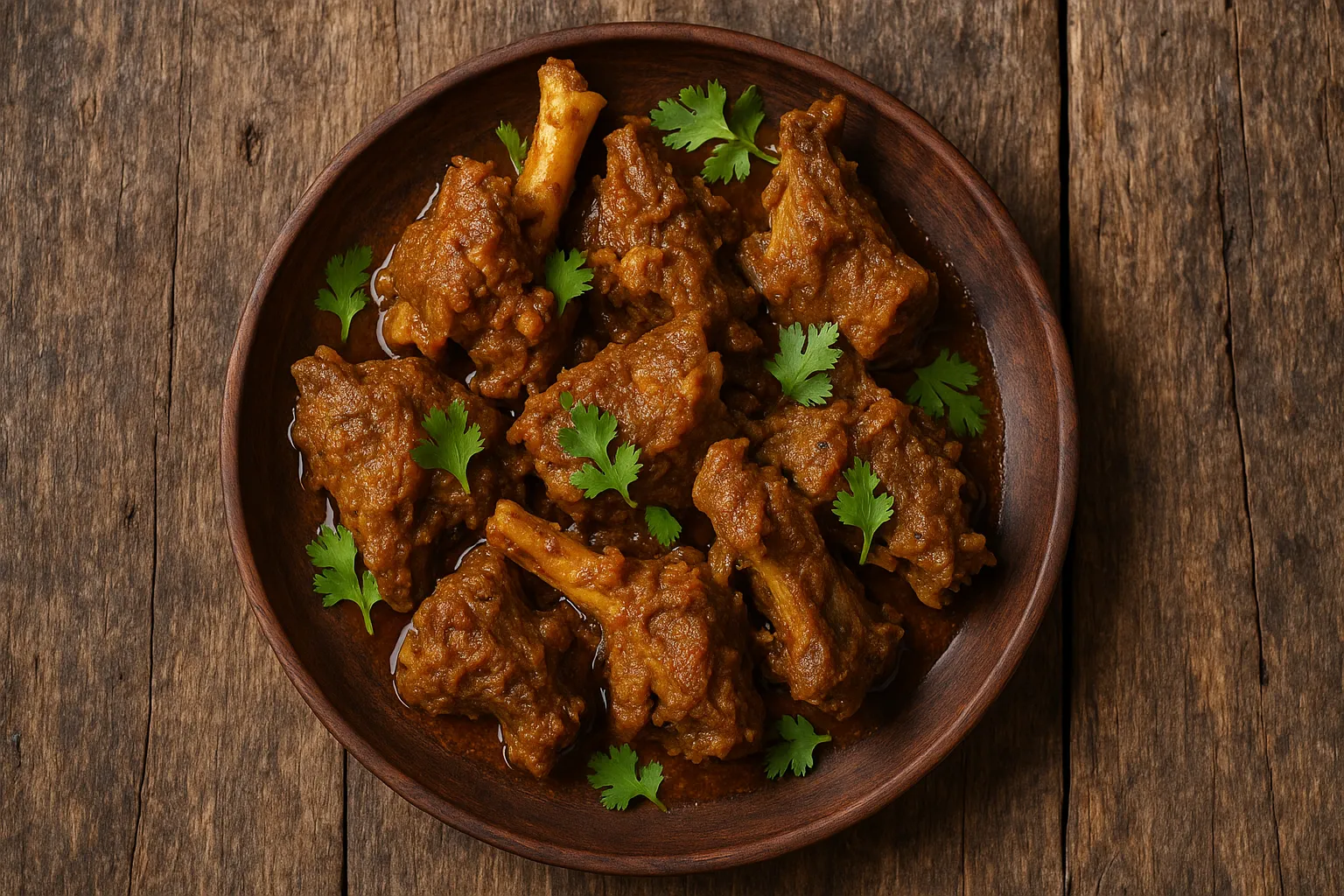Mutton: Calories, Nutrition and Health Benefits
Premium protein source packed with iron, zinc, and B12 for muscle building, immunity, and energy production.
Quick Nutrition Facts
Per 100g Cooked Mutton
| Nutrient | Amount |
|---|---|
| Calories | 233 kcal |
| Protein | 33.4g |
| Fat | 11.1g |
| Carbohydrates | 0g |
| Saturated Fat | 5.1g |
| Cholesterol | 109mg |
| Iron | 4.8mg |
| Zinc | 5.9mg |
| Vitamin B12 | 4.44mcg |
| Selenium | 38mcg |
Macronutrient Breakdown

NUTRITIONIST INSIGHT
Mutton delivers 67% of daily protein needs in just 100g. Rich in heme iron (better absorbed than plant iron), zinc for immunity, and B12 for energy—ideal for muscle gain and preventing anemia.
Myth Busters
MYTH #1: Mutton Causes Weight Gain
TRUTH: Mutton itself doesn't cause weight gain; excess calories do. With 33g protein per 100g, it promotes satiety and muscle preservation. Choose lean cuts, control portions (100-150g), and use healthy cooking methods.
MYTH #2: Red Meat Always Causes Diabetes
TRUTH: While high consumption (>50g/day processed meat) increases diabetes risk, moderate intake of unprocessed mutton (2-3 times/week) can fit a healthy diet. The zero carbs and high protein help stabilize blood sugar when paired with vegetables.
MYTH #3: Mutton Is Unsafe During Pregnancy
TRUTH: Well-cooked mutton provides essential nutrients for pregnancy: iron prevents maternal anemia, protein supports fetal growth, zinc boosts immunity. Cook to 75°C internal temperature; avoid raw/undercooked meat.
MYTH #4: All Red Meat Is Equally Unhealthy
TRUTH: Unprocessed mutton differs from processed meats (sausages, cured meats). Fresh mutton provides complete protein, iron, and B12 without added nitrates or sodium. Processing method and frequency matter more than the meat itself.
MYTH #5: Mutton Has No Place in Modern Diets
TRUTH: Mutton offers nutrient density: 33g protein, 4.8mg iron, 5.9mg zinc, 4.44mcg B12 per 100g. When consumed mindfully (2-3 times/week, lean cuts), it supports muscle health, prevents anemia, and provides bioavailable nutrients hard to obtain from plants alone.
NutriScore by Health Goals
| Health Goal | NutriScore | Why This Score? |
|---|---|---|
| Weight Loss |  | High protein (33g) promotes fullness but 233 calories add up quickly. Limit to 100-150g per serving, choose lean cuts, pair with vegetables. |
| Muscle Gain |  | Excellent protein source (33g) with all essential amino acids, iron for oxygen transport, zinc for testosterone, B12 for energy. Ideal post-workout. |
| Diabetes Management |  | Zero carbs, high protein stabilizes blood sugar. Moderate intake (2-3 times/week), choose lean cuts, pair with fiber-rich vegetables. |
| PCOS Management |  | High protein supports insulin sensitivity and hormone balance. Limit saturated fat; choose lean cuts, 2-3 servings/week. |
| Pregnancy Nutrition |  | Rich in iron prevents maternal anemia, protein supports fetal growth, zinc boosts immunity, B12 essential for nerve development. |
| Viral/Flu Recovery |  | High protein aids tissue repair, zinc supports immune function (5.9mg = 54% DV), B12 boosts energy. Easy to digest when cooked tender; pair with warming spices. |
PERSONALIZED NUTRITION
Track your meals with NutriScan for personalized NutriScores based on your specific health goals!
Blood Sugar Response to Mutton
Mutton has minimal impact on blood glucose due to zero carbohydrates and high protein content.
Typical Glucose Response Curve
*This chart shows typical blood glucose response for general healthy individuals. Individual responses may vary. Not medical advice.*
Optimize Blood Sugar Control
Pairing mutton with vegetables and healthy fats ensures stable blood sugar and provides balanced nutrition:
- 🥬 Leafy greens (spinach, kale) - Fiber slows digestion, adds micronutrients
- 🥦 Cruciferous vegetables (broccoli, cauliflower) - Fiber and antioxidants
- 🥕 Root vegetables (carrots, turnips) - Complex carbs for sustained energy
- 🫒 Olive oil or ghee - Healthy fats improve satiety and nutrient absorption
This combination provides complete nutrition while maintaining stable blood glucose levels.
Cultural Significance
Mutton holds deep cultural and culinary importance across civilizations, valued for flavor, nutrition, and ceremonial use.
In India:
- Central to festive cuisines: Rogan Josh, Biryani, Nihari, Haleem
- Traditional medicine (Ayurveda) recommends mutton for strength and vitality
- Religious significance: offered during festivals and celebrations
- Regional specialties: Hyderabadi mutton biryani, Kashmiri rogan josh, Kerala mutton stew
Global Impact:
- Middle Eastern cuisine: Kebabs, shawarma, mansaf (national dish of Jordan)
- Mediterranean diet: Slow-cooked stews with herbs and vegetables
- Central Asian traditions: Pilaf, shashlik, beshbarmak
- Sustainable livestock: Sheep thrive on marginal lands unsuitable for crops
Compare & Substitute
Mutton vs Similar Protein Sources (Per 100g Cooked)
| Nutrient | 🍖 Mutton | 🐔 Chicken Breast | 🥩 Beef | 🐟 Salmon |
|---|---|---|---|---|
| Calories | 233 kcal | 165 kcal | 250 kcal | 206 kcal |
| Protein | 33.4g | 31g | 26g | 25g |
| Fat | 11.1g | 3.6g | 15g | 12g |
| Carbs | 0g | 0g | 0g | 0g |
| Iron | 4.8mg | 0.9mg | 2.6mg | 0.3mg |
| Zinc | 5.9mg | 1mg | 6.3mg | 0.4mg |
| Vitamin B12 | 4.44mcg | 0.3mcg | 2.6mcg | 3.2mcg |
| Selenium | 38mcg | 27mcg | 25mcg | 36mcg |
| Best For | Iron needs, muscle gain, traditional recipes | Low-fat protein, weight loss | Iron and zinc, muscle building | Omega-3s, heart health |
Frequently Asked Questions
Is mutton good for weight loss?
Mutton can support weight loss when consumed in moderation as part of a balanced, calorie-controlled diet. With 33g protein per 100g, it promotes satiety and preserves muscle mass during weight loss.
Best practices: Choose lean cuts (leg, loin); limit portions to 100-150g per serving; trim visible fat; use grilling, roasting, or slow-cooking methods; pair with vegetables; limit to 2-3 times per week.
Can diabetics eat mutton?
Yes, diabetics can eat mutton in moderation. With zero carbohydrates and 33g protein per 100g, mutton has minimal impact on blood sugar levels and provides sustained energy.
Tips for diabetics: Choose lean cuts to reduce saturated fat; limit to 2-3 servings per week; pair with high-fiber vegetables (leafy greens, broccoli, carrots); trim visible fat; monitor blood sugar response; consult your healthcare provider for personalized advice.
How much protein is in mutton?
Cooked mutton contains 33.4g of protein per 100g, making it one of the richest protein sources. This high-quality complete protein provides all essential amino acids needed for muscle building, tissue repair, and immune function.
A 150g serving delivers approximately 50g protein—covering 100% of daily protein needs for most adults. Ideal for muscle gain, post-workout recovery, and high-protein diets.
What are the main health benefits of mutton?
Key Benefits:
- High-Quality Protein: 33g per 100g supports muscle building, tissue repair, and satiety
- Iron-Rich: 4.8mg (27% DV) of heme iron prevents anemia, supports oxygen transport
- Zinc Powerhouse: 5.9mg (54% DV) boosts immunity, wound healing, testosterone production
- Vitamin B12: 4.44mcg (185% DV) essential for nerve health, energy production, red blood cell formation
- Selenium: 38mcg (69% DV) provides antioxidant protection, supports thyroid function
- Complete Amino Acids: All essential amino acids for optimal health
Is mutton safe during pregnancy?
Yes, well-cooked mutton is safe and highly beneficial during pregnancy. It provides essential nutrients for both mother and baby: iron prevents maternal anemia, protein supports fetal growth and development, zinc strengthens immune function, B12 is crucial for nervous system development.
Safety guidelines: Always cook to 75°C (167°F) internal temperature; avoid raw, undercooked, or processed mutton; choose lean cuts; limit to 2-3 servings per week; pair with vegetables for balanced nutrition. Consult your healthcare provider for personalized dietary advice.
What is the difference between mutton and lamb?
Lamb comes from sheep under 1 year old—tender texture, mild flavor, lighter color, ~250 calories per 100g. Best for: Quick cooking methods, delicate dishes, those preferring milder taste.
Mutton comes from mature sheep over 2 years old—firmer texture, stronger "gamey" flavor, darker red color, ~233 calories per 100g. Best for: Slow cooking, curries and stews, traditional recipes, richer flavor profiles.
Nutritionally: Both provide similar protein (30-33g per 100g), iron, zinc, and B12. Mutton has slightly more iron and zinc due to the animal's maturity.
How often should I eat mutton?
General Guidelines:
- 2-3 times per week - Most adults for balanced nutrition
- 1-2 times per week - Weight loss, high cholesterol, or cardiovascular concerns
- 3-4 times per week - Athletes, muscle gain, high protein needs
- Limit or avoid - Kidney disease, gout, specific medical conditions (consult doctor)
Portion sizes: 100-150g per serving for weight maintenance; 150-200g for muscle gain; 80-100g for weight loss or health concerns.
Track your meals with NutriScan app to see how mutton fits your personal nutrition goals.
 ChatGPT
ChatGPT  Claude
Claude  AI Mode
AI Mode  Perplexity
Perplexity 



